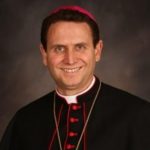When St. Teresa of Kolkata received the Nobel Peace Prize in 1979, as everyone was watching to see what this saintly woman from the slums of India would say about peace, she shocked the world when she said, “The greatest destroyer of peace today is the cry of the innocent, unborn child. For if a mother can murder her own child in her own womb, what is left for you and for me to kill each other?”
She repeated the same line in front of President Bill Clinton and First Lady Hillary Clinton at the national prayer breakfast in 1994. She also added: “Any country that accepts abortion is not teaching its people to love, but to use any violence to get what they want. This is why the greatest destroyer of love and peace is abortion.”

It is in the light of the prophetic voices of these two saints that we can come to understand the voting advice the U.S. bishops approved last November in their statement on the upcoming election: “The threat of abortion remains our preeminent priority because it directly attacks life itself, because it takes place within the sanctuary of the family, and because of the number of lives destroyed.”
Of course, this does not mean that there are not many other ways that we are called to respect and defend life. As the bishops also say in their statement: “At the same time, we cannot dismiss or ignore other serious threats to human life and dignity such as racism, the environmental crisis, poverty and the death penalty.”
If you read “Evangelium Vitae” by St. John Paul II, which I highly recommend you do, you will find this full picture of what it means to respect life, which includes condemnations of euthanasia, racism and the death penalty as well as the Church’s concern for the poor, the immigrant and the environment. To be pro-life means we must work against all these evils because we proclaim a culture that welcomes and holds up the inherent dignity of each human life regardless of race, creed, sex, special need, age or nationality. Each life is directly willed by God from the moment of conception until natural death and he desires each person to live with him in eternity. And yet the weakest and the most vulnerable have a special claim on our help, especially those who are too young to have a voice of their own. As St. John Paul II says, “Today there exists a great multitude of weak and defenseless human beings, unborn children in particular, whose fundamental right to life is being trampled upon…. Such attacks strike human life at the time of its greatest frailty, when it lacks any means of self-defense.”
This evil, which we perhaps have grown too accustomed to because it has been legal for 57 years, claims more innocent lives than any other in our culture. Almost 1 million abortions happen in our country every year; that is more than 2,000 a day. (And this only counts the surgical abortions and not those done by chemical “contraceptives” that often also cause abortions.) The attitude that treats the inestimable gift of a human life as a choice to be disposed of continues to teach our children that not every human being has inherent dignity and that violence and death may be the answer to their problems.
As Pope Francis has made clear, “This defense of unborn life is closely linked to the defense of each and every other human right. It involves the conviction that a human being is always sacred and inviolable, in any situation and at every stage of development. Human beings are ends in themselves and never a means of resolving other problems. Once this conviction disappears, so do solid and lasting foundations for the defense of human rights, which would always be subject to the passing whims of the powers that be” (“Evangelii gaudium,” No. 213). We will not end racism and violence, we will not heal our culture of death, until we become a culture that recognizes the inherent dignity of the unborn child.
How then are we as Catholics called to proclaim this Gospel of Life?
First, we must always speak of God’s mercy to those who have been directly involved in abortion. We know that many women choose abortion under pressures that limit their culpability; this is why we sponsor healing retreats like Rachel’s Vineyard every year for those who have been wounded by abortion. No sin is beyond God’s mercy, and many women who have had abortions have become incredible pro-life advocates.
Second, we must work to make abortion unnecessary. We are so blessed to have an incredible network of crisis pregnancy centers in the Twin Cities. No woman or man ever needs to choose abortion, because no child is unwanted. These wonderful centers in every community will walk with any woman in a crisis pregnancy and give her the resources to choose life for her child, including offering her adoption with loving parents if that is what the birth mother needs.
Third, we must work for the legal right to life for the unborn. This includes electing civil officials who will work to change our laws regarding abortion and implement other policies that work to safeguard the life and dignity of the unborn. As long as the law of our land enshrines the “right” to kill an innocent child, no one’s rights are safe. What other right matters if there is no right to life itself?
During this Respect Life month, the Church appeals to every Catholic, and every member of society, as St. John Paul II did 25 years ago: “In the name of God: Respect, protect, love and serve life, every human life! Only in this direction will you find justice, development, true freedom, peace and happiness!”



